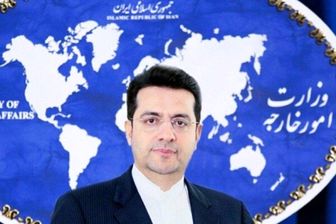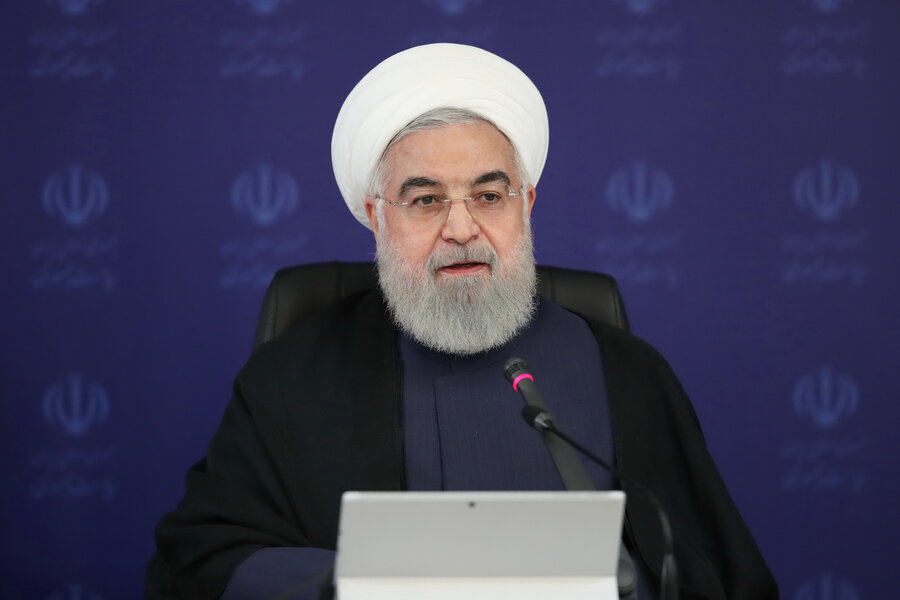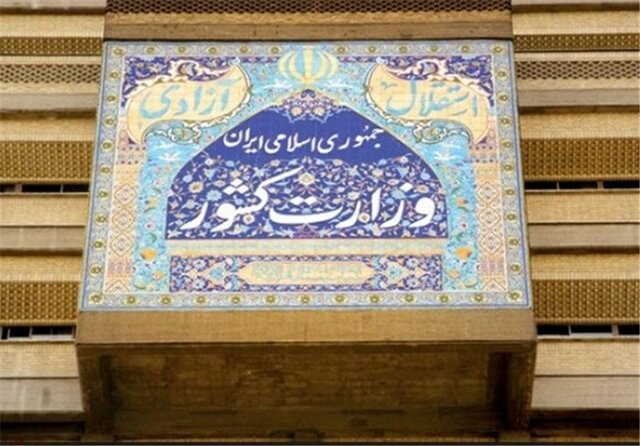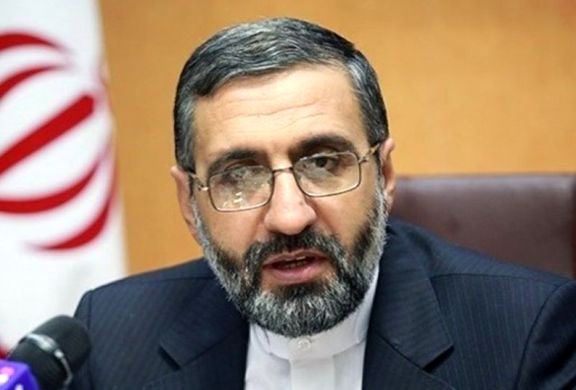
Solution to the Toughest Battle
The editorial of Jahan Sanat asserts that if Iran wants to be able to handle the economic pressures facing the country now, it should fight tooth and nail for its place in the world’s export markets.
Iran’s economy has been hit hard due to three factors: COVID-19 has caused a severe economic fallout, US sanctions are ongoing and expanding, and the government’s monetary, banking and forex policies have failed. The consequences of these pressures on Iran’s economy can be seen at three levels: government, families, and businesses. The government’s suffering is highlighted in its budget deficit rising to 50 percent. Iranian families are facing pressure as their purchasing power has declined, whereas businesses are experiencing difficulties as demand for their products has declined.
Now the question: What should be done to save Iranian businesses from this devouring vortex? The truth is that Iran’s resources are not enough to salvage the economy. Therefore, it must be connected to international markets via exports. As a matter of fact, exporting crude oil and even its products, as well as essential metals, has become very tough for Iran. But developing exports must be on the government’s agenda. It is the main source of conflict between countries today. That is why exporting is the toughest issue in today’s world.
To increase exports, a more powerful diplomatic apparatus must be used, and the world must be assured that Iran’s exports will, for no reason, abruptly come to a halt. Domestic consumers too must be convinced that this, in the long run, will benefit the country.
This is the main battlefield of competition with Iran’s rivals who have plans for every inch of the export market and who compete with everybody ruthlessly. We can see that Iraq’s leadership is taking advantage of Iran’s poor oil exporting conditions and has replaced Iran very quickly. And we have also witnessed how Russia – despite claiming to be Iran’s ally – has raided Iran’s gas export markets. If Iran cannot find its place in world export markets, it should know that soon its domestic market will not be safe.
Lack of Parity Between Powers and Responsibility
The editorial of Jahan Sanat, written by a member of Iran’s Chamber of Commerce, focuses on the problem of managerial power and responsibility within Iran’s administrative structure.
While the country is facing undesirable economic conditions, appointing a capable manager to lead the Ministry of Industry, Mine and Trade can be incredibly significant. Not training competent managers in the past has made it exceedingly difficult to appoint the right people as ministers, deputy ministers, and executive directors of big corporations. Managers and ministers are appointed based on factional and partisan politics.
The existing structures in the country restrict managerial powers. In fact, because of complications, hierarchies, and ambiguities that exist in Iran’s ruling system, higher government officials interfere in the affairs of managers any time they wish to.
The performance of Minister of Industry, Mine and Trade Reza Rahmani, who was recently ousted by Hassan Rouhani, was poor. During his term, the sectors run under his supervision did not see any success.
Friendship With the Poor or Enmity With the Poor?
The editorial of Mostaghel focuses on the paradox and hypocrisy of donating livelihood packages to the poor in Iran.
There is no doubt that there are beautiful scenes taking place in Iran today. We are witnessing people giving livelihood packages to the poor and those impacted by COVID-19. Nevertheless, it seems that the way things are done needs to be changed.
The aim of Islamic compassion is to help the poor and the destitute and not to disregard poverty and destitution in society. We must befriend the poor but fight poverty. There is no glory in filling shrines and mosques with millions of packages. This moves reveals the unprecedented rise in poverty.
The other issue is trampling on the dignity of the poor. For a couple of days, there was video footage aired on Iranian state television showing a taxi driver who lost his job because of COVID-19. He receives a food package decorated with the Red Crescent’s logo and is happy. One should think of this man’s children who are watching their father being humiliated on TV!
It is so shocking when we see several people get together to hand over a livelihood package to a family in need. The donors must be careful not to make these donations just to make themselves feel important.
The real aim in an Islamic society must be to spread justice, not to hand out donations to the needy only. So long as society is not moving in the direction of justice, it cannot control poverty.
Finally, in a society where the government claims justice and compassion for the poor, celebrities are exempt from paying taxes, government managers receive huge salaries, while the annual increase of workers’ wages is much less than the inflation rate. If we are thinking of fighting poverty, we must confront these managerial catastrophes. Otherwise, next year we will be distributing more livelihood packages to the poor.
People Should Invest in the Stock Market With Enough Knowledge
The editorial of Setareh Sobh, inked by the former governor of the Central Bank Ahmad Hatami Yazd, urges people to act wisely while investing in the Iranian stock market if they don’t want to lose their money.
Nowadays the country’s economy is in recession. On the one hand, imposing sanctions has resulted in forex revenues declining; on the other hand, the housing market is in recession. The statistics issued by the central bank show that the number of transactions in the housing sector during the past two months has dropped by 90 percent compared to the same period last year, which means that there is no place for people to invest their savings in this sector.
Also, as a result of inflation, people’s money is losing its value day by day and their savings are shrinking like snow under the sun. Even if a decreasing interest rate is to the advantage of banks, people are not interested in investing their money in banks while the inflation rate has risen to 40 percent. Although, those who save their money in banks will get 20 percent interest, the value of their money has declined by 40 percent because of inflation.
As such people don’t know what to do with their money. For a while, people rushed to the stock market as a result of which stock prices witnessed a fivefold increase in a year and a half. But this situation is not stable and sooner or later will collapse. When the stock market collapses, inexperienced people who have invested in this market will lose their money.
It seems that the economic managers in the country have no roadmap or solution in this regard. The government’s revenues from oil and taxes will decline because selling oil is banned due to sanctions, and, even if possible, it will be in accordance with global market prices. As for taxes, there is a recession in the country, and because of COVID-19, there is no income to be taxed. So, revenues will decline, while expenses are on the rise.
People are now turning to the stock market, but they should be aware of the dangers in that market and act according to the recommendations of economic experts.

More Tensions Between Iran and America Over Iranian Oil Tankers Heading Towards Venezuela

Iranian oil tankers are moving from Iran towards Venezuela which is now facing a fuel shortage crisis. Venezuelan oil refineries that used to produce 1.3 million bpd have in recent years stopped working due to lack of investment and maintenance.
A US senior official later told Reuters news agency in this regard that Washington is preparing a proper response to Iran’s move of sending gasoline shipments to Venezuela, adding that the United States believes that the Venezuelan government is paying Iran in gold for its gasoline shipments.
Pentagon and US Navy officials later announced the deployment of four navy vessels to the Caribbean Sea.
In response, Iran’s Foreign Ministry spokesperson Abbas Mousavi warned that if America takes any measures against Iranian oil tankers, Iran will take retaliatory measures.
Mousavi called the “US threat” against Iranian oil tankers “illegal and disgraceful” saying that “free trade between independent countries is legitimate; what is illegal is interference in these transactions.”
In recent days, Iran’s Foreign Minister Mohammad Javad Zarif, in a letter to the US Secretary General, had warned against US naval deployment in the Caribbean Sea, claiming that the United States has taken this decision “with the intention of creating problems for Iran transporting fuel to Venezuela.”
The Swiss ambassador was reportedly summoned by Zarif’s political deputy, Abbas Araghchi, and through him, America has been warned that “any threats against Iranian oil tankers will face Iran’s immediate decisive reaction.”
Iran and Venezuela are both under US sanctions.
Quds Day Rally Amid COVID-19 Crisis

The Islamic Republic’s establishment has decided to risk people’s lives amid the fatal coronavirus outbreak, asking them to take part in the country’s annual Quds Day ceremony.
President Hassan Rouhani has announced that the Quds Day ceremony – which is held annually on the last Friday of Ramadan and is of great significance to Iran’s regional and international policy of resistance – would be held in Tehran and other cities this Friday but it would be different from previous years due to the coronavirus outbreak.
Rouhani noted that two decisions have been made in this regard, the first of which concerns the cities that fall “in the white zone” COVID-19 category. He added that in his opinion, 218 Iranian cities are in the white zone, although officials say there are 183 cities, “strictly speaking.”
“In these 218 counties where Friday prayers are also held, we can hold the Quds Day ceremony too,” asserted Rouhani, adding that this year the ceremony would be held in places where Friday prayers are currently held and with the observance of health protocols. He ruled out any marches on this day in those cities.
As for Tehran, Rouhani pointed out that since it is in the red zone and Friday prayers are not held there, the Quds Day ceremony would be held as a “march in cars.” He added that it is inappropriate not to hold any ceremonies in Tehran which is “the capital and center of the country” on this day.
Iran’s president continued: “It was decided that there could be vehicular movement – a sort of promotional and mobilizing movement – in which vehicles can move from an origin to a destination.” He also remarked that in vehicles “certain hymns can be broadcast, and certain flags can be held in hands.”
Hassan Rouhani concluded by saying that the Islamic Revolutionary Guard Corps would be responsible for holding the ceremony in Tehran.
It should be noted, however, that the IRGC spokesperson had recently said that the ceremony would be cancelled this year due to the coronavirus pandemic. Yet, the Islamic Development Organization (IDO) challenged the IRGC decision, proposing that the Quds Day marches could be held in the cities which are safe, and people can participate in a march in their cars in other cities.
“The Quds Day has not been canceled under any conditions in the past 40 years, and it will not be canceled this year either, because commemorating this day is the religious and national duty of all devout people – even during the coronavirus outbreak,” asserted Nasrollah Lotfi, an IDO official.
Who Will Take Responsibility for the Crackdown on Protesters in November?

The November protests started in a few cities against the price of gasoline rising and quickly spread to the entire country and turned into anti-establishment demonstrations. According to different news and human rights sources, more than 1,500 were killed and thousands were arrested during these protests. But Iranian officials are still playing the blame game; no one has taken responsibility for the crackdown.
This week, Iran’s Interior Ministry sent a letter to the Parliament, saying it accepts no blame for the November 2019 events, after Parliament member Ali Motahari held the Interior Minister Abdolreza Rahmani-Fazli responsible for the severe crackdown on protesters during the nationwide protests in November 2019 – which left hundreds dead and resulted in the arrests of thousands of demonstrators.
“The interior minister is the main culprit of the November events during which many were killed,” said Motahari, adding that he and a number of Parliament members had called for the interior minister’s impeachment at the time as well. In its letter, the Interior Ministry called on Ali Motahari to offer evidence to support his claims “or else it would legally pursue this issue via Iran’s competent authorities.”
Motahari’s remarks came under fire by some lawmakers as well. Mojtaba Zolnour, head of the Parliament’s National Security and Foreign Policy Committee, noted: “The interior minister had done nothing but obey the orders of the president and execute the orders of the Supreme National Security Council.”
More Death Sentences Handed Down to Fight Financial Corruption

In Iran, many cases against financial corruption are filed and the prime suspects are usually given titles such as “ the gold coin king,” “the embezzlement king,” and “the sugar king.”
Usually these people are put on trial in special courts and heavy sentences are handed down to them. It is not clear, however, how effective such courts and heavy sentences have been in combating corruption in Iran, as more cases of corruption continue to emerge in the country.
In the most recent example, Iranian Judiciary Spokesman Gholam Hossein Esmaili announced the sentences handed down to those individuals involved in the disruption of Iran’s forex system as well as the automobile industry.
Vahid Behzadi – known as “ the automobile king” – and his wife, Najva Lashiedai have been sentenced to death on the charge of “collaboration in the massive disruption of the country’s monetary and forex system,” as noted by Esmaili. The sentence can be appealed, he added.
Moreover, two lawmakers – Fereydoun Ahmadi and Mohammad Azizi – have been sentenced to 61 months of discretionary imprisonment. They were previously arrested for being involved in a corruption case related to SAIPA, Iran’s second largest auto manufacturer, and were later released on a 10 billion toman bail.
SAIPA and Iran Khodro are both subsidiaries of the Industrial Development and Renovation Organization of Iran.
The level of corruption in Iran has become so extensive that Iran’s former head of the judiciary Sadeq Larijani ordered the formation of special courts to handle this issue. Iranian Friday mass prayer leaders have also called for suspects to be strongly confronted, with the need to hand down death sentences, without ever pointing to the root cause of such extensive corruption within Iran.
